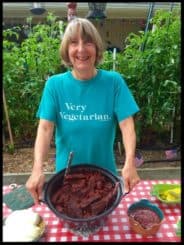
Editor’s Note: Back by popular demand! Wondering what to feed your friends and family on the Fourth of July to celebrate while still being CreatureKind? Carol J. Adams has some ideas, complete with recipes, right here.
My spouse, Bruce, has been the Associate Pastor for Community Ministries at a church in Dallas for 30 years. When we first arrived we learned that the Fourth of July barbecue hosted by the church’s senior activities group was “a must.” To us northerners, it was more than strange that anyone would choose to be outside in 100° temperatures on July 4. On top of it, and to my dismay, the event was centered on chicken.
Ten years into Bruce’s ministry here the people who hosted the barbecue had aged and were unable to host it any longer. For a few years, the barbecue rotated between other elderly members, and then no one could host it. The barbecue went dark for a couple of years. Then I said to Bruce, “If all they need is a backyard in which to have their celebration, we can do it!”
But there was the issue of the chicken. This needed to be addressed. So I began serving vegan drumsticks. I bought them from my local vegan Chinese restaurant. She stocked them in bags of 80. They are little pieces of seitan on a cane sugar stick. I would slather barbecue sauce on half of them and olive oil on the other half, bake them and serve them. They were a huge success, and a curiosity.
But the Chinese restaurant went out of business. So I decided to make my own barbecue. First I used frozen tofu. One year I used tofu, tempeh, and seitan in barbecue sauce. (It’s the barbecue sauce that really matters!)
Everyone adjusted to the change in the main course and the request to bring vegetables or fruit (and no meat). What I was preparing became a matter of interest.
The barbecued unribs pictured above are a little labor-intensive, but while preparing them I make a point to listen to an audiobook about US history. At church the week following the serving of these unribs, I saw some of the matriarchs of the church. One said, “When I was asked how the barbecue was, I reported I had the best ribs ever!”
A faster barbecue recipe uses jackfruit instead of seitan. You hardly need any time at all!
A barbecue is incomplete without macaroni and cheese, and I created the most luscious, richest, outrageous vegan mac and cheese recipe. I added a little kale just to prevent its complete descent to decadence.

One friend, a nonagenarian and very proper Southerner, went back for thirds!
Of course, some cole slaw is necessary. Use a vegan mayonnaise and you don’t have to worry about the eggs in the mayonnaise going bad in the sun! (Veganism has so many side benefits.)
Finally, we always end with a Texas sheet cake. If I mention ordering a cake, there are protests: this is the cake that must complete the barbecue.
As people are finishing their meals, Bruce brings out his miniature cannon and sets it off. But that is another story. The vegan barbecue has found its place in the hearts—and stomachs—of at least one Texas congregation.
Why stop there?
Carol J. Adams is the author of numerous books including The Sexual Politics of Meat: A Feminist-Vegetarian Critical Theory, now celebrating its 25th anniversary. She has written several books on living as a vegan, including Never Too Late to Go Vegan: The Over-50 Guide to Adopting and Thriving on a Vegan Diet (with Patti Breitman and Virginia Messina), Living Among Meat Eaters: The Vegetarian’s Survival Guide, and How to Eat Like a Vegetarian Even if You Never Want to Be One. She is the author of Woman-Battering, in Fortress Press’s Creative Pastoral Care and Counseling Series. With Marie Fortune, she edited Violence Against Women and Children: A Christian Theological Sourcebook, and she is the author of the training manual, Pastoral Care for Domestic Violence for Christian Audiences. She has a Masters of Divinity from Yale University.


